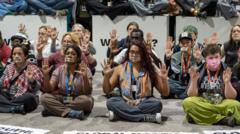With the conclusion of COP29, a significant climate finance agreement has sparked intense debate regarding its adequacy, particularly among developing nations. The $300 billion (approx. £240 billion) annual fund set to begin by 2035 has been described by representatives from these countries as “paltry,” despite it being an upgrade from the previous $100 billion (approx. £79.8 billion) contribution.
Delegates from developing nations, such as India's Chandni Raina, criticized the agreement, labeling it an “optical illusion” that fails to address the catastrophic realities they face. The apprehension stems from the belief that this mixed package of grants and loans is insufficient. Many were frustrated by the wealthy nations’ last-minute negotiations, arguing that it compromised their integrity and urgency in tackling climate change.
The divide between wealthier and poorer nations was starkly highlighted as developing countries, despite their displeasure, felt they had no choice but to accept what was presented. The pressures of global politics loomed large, with arguments that opportunities for better deals may vanish with the anticipated return of climate skeptic Donald Trump to U.S. leadership next year. There is a pervasive fear that a more generous financial settlement could have galvanized efforts to curb emissions—a critical necessity, given the contributing 75% of growth in emissions attributed to emerging economies in the past decade.
The role of the host country, Azerbaijan, came into scrutiny as well. Sharing a history of oil dependency and recent authoritarian governance, the summit's success was hindered by the host's confrontational stance against perceived Western criticism. Many insiders lamented that this was among the least effective COP conferences to date, culminating in a collective call for a reevaluation of COP's structure and mission.
In the absence of strong U.S. leadership, attention shifted to China's involvement—often seen as a potential climate leader. Although China maintained a relatively muted presence at COP29, it made headlines with the disclosure of its climate finance contributions. While still categorized as a developing nation, China’s willingness to voluntarily contribute to climate initiatives could signify its emergence as a key player on the global stage.
As discussions surrounding Trump's potential impact on the climate agenda buzzed in the Baku conference halls, there was an underlying consensus among delegates that a proactive strategy was necessary to withstand any regression should Trump return to power.
The more aggressive tactics employed by environmental NGOs at COP29 noticeably shifted the tone of the discussions. Campaigners, intensely vocal, urged for outright rejection of the current deal, instigating tumultuous responses from delegates, hinting at a future characterized by escalated confrontations in climate diplomacy. The question remains: will this assertive activism reshape negotiations moving forward?
As countries consider the implications of COP29, the consensus remains divided. The signatories celebrate the agreement as progress, while many contend it falls far short of what is required to confront the escalating climate crisis.
Delegates from developing nations, such as India's Chandni Raina, criticized the agreement, labeling it an “optical illusion” that fails to address the catastrophic realities they face. The apprehension stems from the belief that this mixed package of grants and loans is insufficient. Many were frustrated by the wealthy nations’ last-minute negotiations, arguing that it compromised their integrity and urgency in tackling climate change.
The divide between wealthier and poorer nations was starkly highlighted as developing countries, despite their displeasure, felt they had no choice but to accept what was presented. The pressures of global politics loomed large, with arguments that opportunities for better deals may vanish with the anticipated return of climate skeptic Donald Trump to U.S. leadership next year. There is a pervasive fear that a more generous financial settlement could have galvanized efforts to curb emissions—a critical necessity, given the contributing 75% of growth in emissions attributed to emerging economies in the past decade.
The role of the host country, Azerbaijan, came into scrutiny as well. Sharing a history of oil dependency and recent authoritarian governance, the summit's success was hindered by the host's confrontational stance against perceived Western criticism. Many insiders lamented that this was among the least effective COP conferences to date, culminating in a collective call for a reevaluation of COP's structure and mission.
In the absence of strong U.S. leadership, attention shifted to China's involvement—often seen as a potential climate leader. Although China maintained a relatively muted presence at COP29, it made headlines with the disclosure of its climate finance contributions. While still categorized as a developing nation, China’s willingness to voluntarily contribute to climate initiatives could signify its emergence as a key player on the global stage.
As discussions surrounding Trump's potential impact on the climate agenda buzzed in the Baku conference halls, there was an underlying consensus among delegates that a proactive strategy was necessary to withstand any regression should Trump return to power.
The more aggressive tactics employed by environmental NGOs at COP29 noticeably shifted the tone of the discussions. Campaigners, intensely vocal, urged for outright rejection of the current deal, instigating tumultuous responses from delegates, hinting at a future characterized by escalated confrontations in climate diplomacy. The question remains: will this assertive activism reshape negotiations moving forward?
As countries consider the implications of COP29, the consensus remains divided. The signatories celebrate the agreement as progress, while many contend it falls far short of what is required to confront the escalating climate crisis.





















